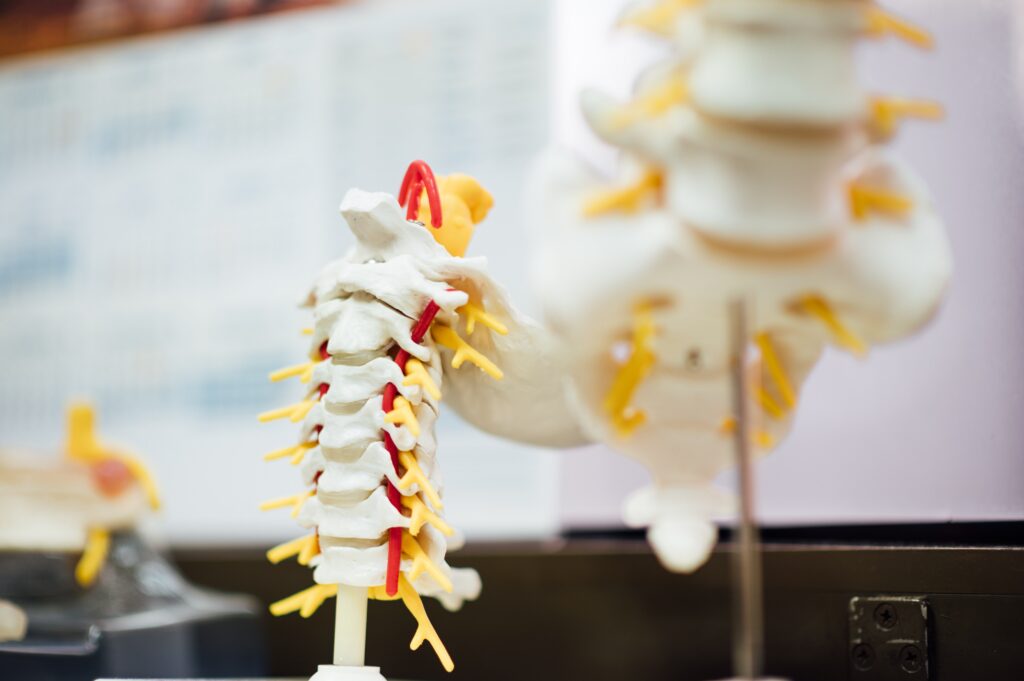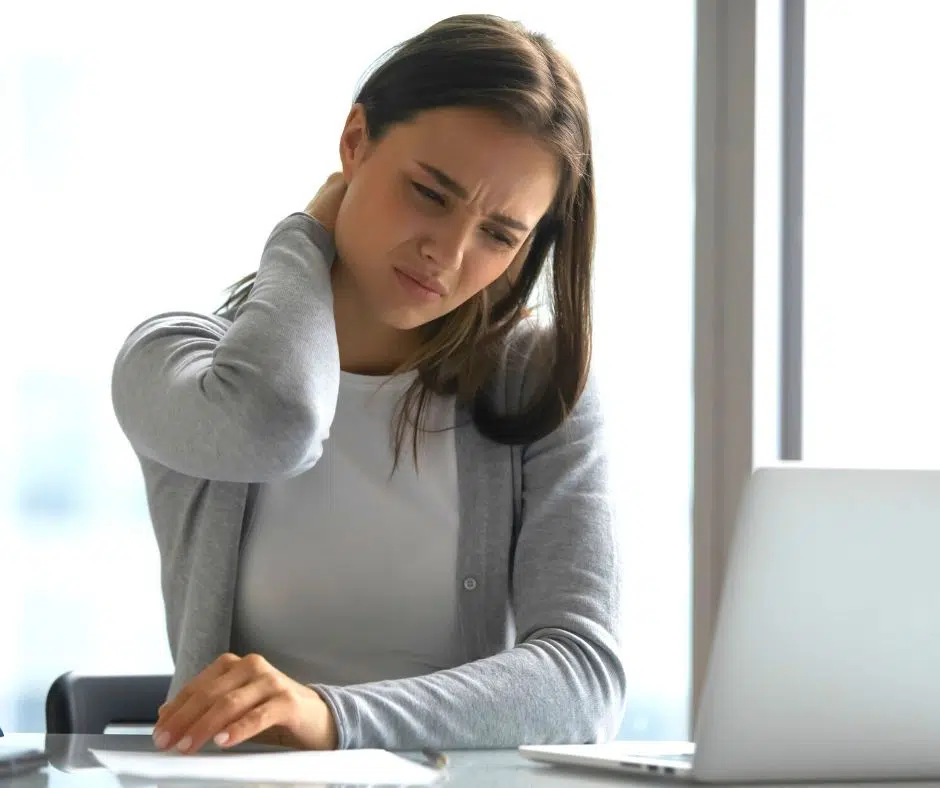Can a Slip and Fall Accident Cause a Bulging Disc?
A bulging or slipped disc in the spine can occur naturally over time. But these injuries can also result from certain kinds of unusual movements or landings, like those that happen during a slip and fall accident.
Slip and fall accidents can happen any time of the year, but each winter season brings with it even more reasons for concern. The wintry weather’s accumulated snow and ice, increases the chance for a slip and fall and the risk for a spinal injury such as a bulging disc or slipped disc.
What Exactly Is a Bulging Disc?
The spine is made up of 33 individual interlocking bones called vertebrae that form the spinal column. Each of these has a main function: to carry the body’s weight, protect the spinal cord, and help carry various signals from the brain out to the body’s muscles and ligaments. Between the vertebrae are discs that absorb shock and help the body move.
A bulging or slipped disc results when a disc swells or bulges through the spine’s crevices. It can occur anywhere along the spine, but it most often shows up in the lower back or neck. A bulging or slipped disc can happen from twisting or lifting something heavy or as a natural occurrence as the body ages. As noted earlier, however, this bulging or slipping can also be the result of impact trauma during a slip and fall accident.
Symptoms to Watch for After a Slip and Fall
There really is no way to know if a bulging or slipped disc injury has happened after a slip and fall accident on one’s own. A doctor needs to complete an examination for a proper diagnosis. But there are some basic symptoms that an individual can watch for following the accident that might signal the need for further medical attention. These may include:
- Pain and tingling in the neck, shoulders, arms, hands, and/or fingers
- Upper back pain, as well as back pain that stretches to the chest or stomach
- Lower back pain
- Muscle spasms
A bulging disc is different than a herniated disc. A herniated disc is a spinal injury that happens when the disc between vertebrae tears and pushes its jelly-like center through the spine’s crevices. The resulting pressure placed on the nerves from a herniated disc injury can cause pain, numbness, or weakness in an arm or leg, or it may cause no symptoms at all.
Seeing a doctor at once following a slip and fall is important, as the type and level of pain vary from person to person. After any type of accident, symptoms may not be obvious or show up right away. A medical examination may discover a bulging disc spinal injury before it displays any symptoms.
Diagnosing a Bulging Disc Injury
Getting checked out by a doctor immediately following a slip and fall is an important first step in making sure the victim gets needed treatment and relief. A medical diagnosis for any potential injuries resulting from the incident will also more substantially support any personal injury claim filed by the injured person.
A medical diagnosis that may indicate a bulging or slipped disc injury will start with a complete description of the accident along with a physical exam. The doctor will most likely ask the following questions:
- How did the slip and fall happen?
- Were there any injuries?
- Where is the pain being felt?
- Is there any numbness? If so, where?
- Is there any weakness? If so, where?
- Have these problems, or something like them, been experienced before?
- Has there been any recent noticeable weight loss or gain, fevers, or other illnesses?
- Are there any problems with urinating or with bowel movements?
The doctor is likely to suggest taking X-rays of the lower back or other potentially injured areas. They may also want the victim to have an MRI or CAT scan to better understand the level of damage and pain. If a damaged nerve is suspected, the doctor may further order electrical tests.
Tests like these will help decide what treatment is needed, as well as if surgery is required. However, these tests are expensive. If the slip and fall was due to someone else’s negligence, legal representation can be as important as medical care. An experienced attorney will help a victim receive fair compensation to recover the costs in an injury claim.
Treating a Bulging Disc Injury

Photo by CHUTTERSNAP on Unsplash
Treatment for a bulging disc, or slipped disc, depends on the symptoms and the healing progress following a slip and fall. If the victim’s symptoms continue to improve, time, rest, and possibly some over-the-counter pain medication might be all that is needed.
But any back injury can also be quite serious. A victim can experience extreme pain, immobility, or perhaps lost wages due to an inability to work. The most important thing they can do is get thorough medical attention and necessary treatment, which may also mean medication prescriptions, physical therapy, and even surgery.
The costs for treatment can be high as the medical bills pile up. This makes the victim’s slip and fall injury claim even more important toward being able to pay for care. The victim’s focus should be on healing and getting well. Working with an experienced law firm can help ensure that the slip and fall accident victim makes a valid claim that is fairly compensated when someone else is responsible.
Following a Slip and Fall, Next Steps Are Important
Whether the slip and fall took place at a store or other business, on someone’s private property, or at a public building, it is important to act quickly. No matter where the incident occurs, be sure to follow these steps:
- Seek medical attention. Call an ambulance or have someone else help you to get your injuries checked out at once. Do not decline medical attention.
- Tell the property owners right away. Be sure to ask for copies of any reports they complete.
- Fully document the incident. Gather names and contact information from any witnesses to the accident. Take photos of where your slip and fall occurred, of any visible bodily injuries, and any clothing damage. It is important to note every detail about the accident while it is still fresh in your mind.
- Gather and keep all paperwork, including anything you receive about the incident from the property owner, medical professionals, and first responders.
- Contact an attorney. An experienced personal injury law firm that has successfully handled slip and fall cases such as Hipskind and McAninch can help determine if you have a case. They will also help file the claim, manage the paperwork, and get a fair settlement.
- Continually document any changes you notice in your daily life throughout your entire time of treatment and healing.
- Do not post on social media about the incident or talk to anyone about it. Be sure not to accept blame or to blame anyone else. Do not make statements to the property owners, their staff, or any insurance representatives without first talking to an attorney.
- Do not sign anything from the property owners or their insurance company, as it could waive your rights.
Following these steps not only helps to make sure a victim’s injuries are taken care of, it also helps to build a valid case for their slip and fall injury claim.
How Will I Know If I Have a Slip and Fall Claim?
Not every slip and fall accident or injury results in a court case. For a valid claim, the victim must be able to prove:
- When and where the slip and fall happened
- The injuries were a direct result of the fall
- The owners (or their employees) were at fault
- Expenses the victim incurred (such as medical bills, lost wages, etc.) that are included in their claim directly resulted from the slip and fall accident and resulting injuries
And when it comes to snow and ice slip and fall accidents, both Missouri and Illinois laws protect property owners from liability under what’s known as the “natural accumulation rule.”
The natural accumulation rule states that property owners are not required to clear snow and ice from walking surfaces when it has accumulated naturally, including untouched snowfall, snowdrifts, ice resulting from melting and refreezing, pedestrian and vehicle tracks made in the snow, and snow that has fallen from vehicles.
A property owner can be liable for a person’s injury, however, if it can be proven that they contributed to the conditions that led to the slip and fall. This falls under a rule of “premises liability.” For example, if the owner shovels the sidewalk and piles the snow up in front of the entrance, forcing visitors to walk along a hazardous path to enter, they may be held liable for the accident and resulting injuries.
One Final Note
If a slip and fall results in a bulging disc, slipped disc, or other personal injuries through no clear fault of one’s own, the victim has the right to pursue fair compensation and to hold a property owner responsible. The best action following any slip and fall accident is to take care of your health and to contact an experienced attorney to help fight for your best interests.
Category:
Tags:

